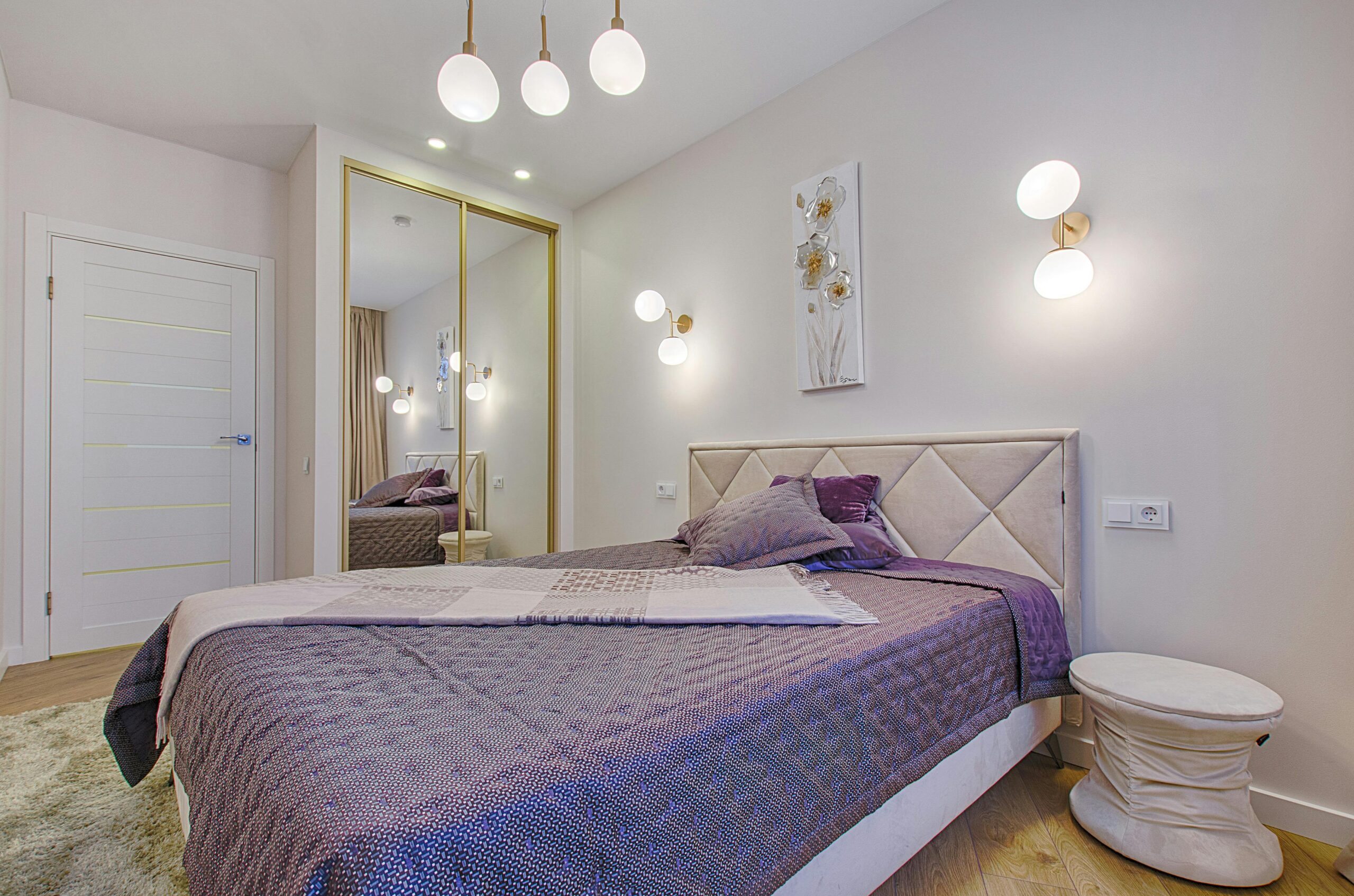
You know that feeling when you walk into a tiny hotel room in Manhattan, and somehow it feels more spacious than your actual bedroom back home? The secret isn’t magic—it’s masterful color selection. I’ve spent years studying how color transforms small spaces, and I’m here to share the game-changing schemes that’ll make your compact bedroom feel like a breath of fresh air.
Your bedroom should be your sanctuary, not a cramped afterthought. Whether you’re dealing with a studio apartment or just got stuck with the smallest room in the house, the right colors can completely transform how your space feels and functions.
Why Color is Your Small Bedroom’s Best Friend
Before we dive into specific schemes, let’s talk about why color matters so much in
small bedroom interior design. Light bounces differently in tight spaces. Your brain processes visual information about room size based on what it sees first. Dark corners make spaces feel closed in, while strategic light placement and color choices can literally trick your eyes into seeing more square footage than actually exists.
Think of color as your interior design superpower—one that costs way less than knocking down walls.
The Science-Backed Champions: Light and Neutral Color Schemes
Classic Whites and Off-Whites
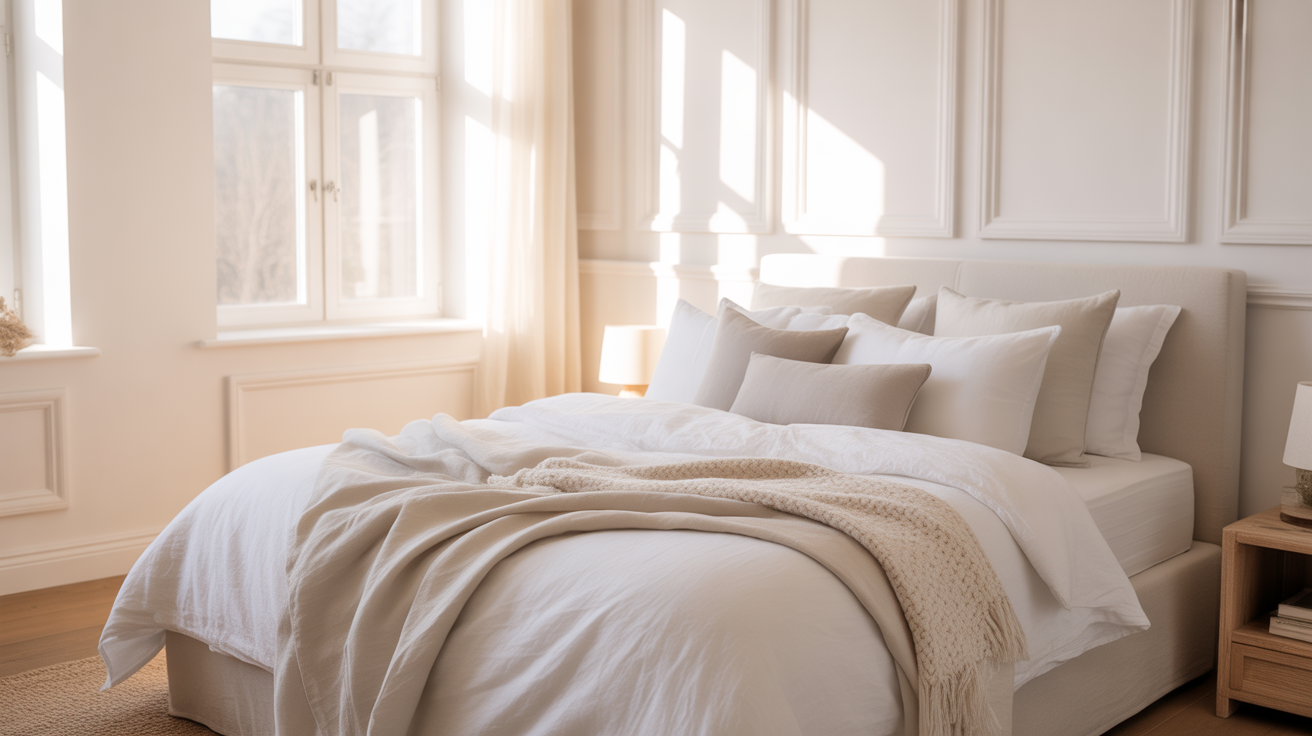
White remains the undisputed champion of
small space bedroom solutions. But here’s where most people go wrong—they think all whites are created equal. They’re not.
Pure white can feel clinical and cold, especially in bedrooms without abundant natural light. Instead, consider these sophisticated alternatives:
- Warm white (Benjamin Moore’s Cloud White): Creates a cozy atmosphere while maintaining spaciousness
- Soft ivory (Sherwin Williams’ Creamy): Adds warmth without sacrificing the space-expanding effect
- Pearl white (Farrow & Ball’s Pointing): Offers subtle depth and elegance
The beauty of white lies in its versatility. You can layer textures—think linen bedding, wool throws, and wooden furniture—without overwhelming the space. Plus, white reflects natural light better than any other color, making your room feel brighter throughout the day.
Sophisticated Grays
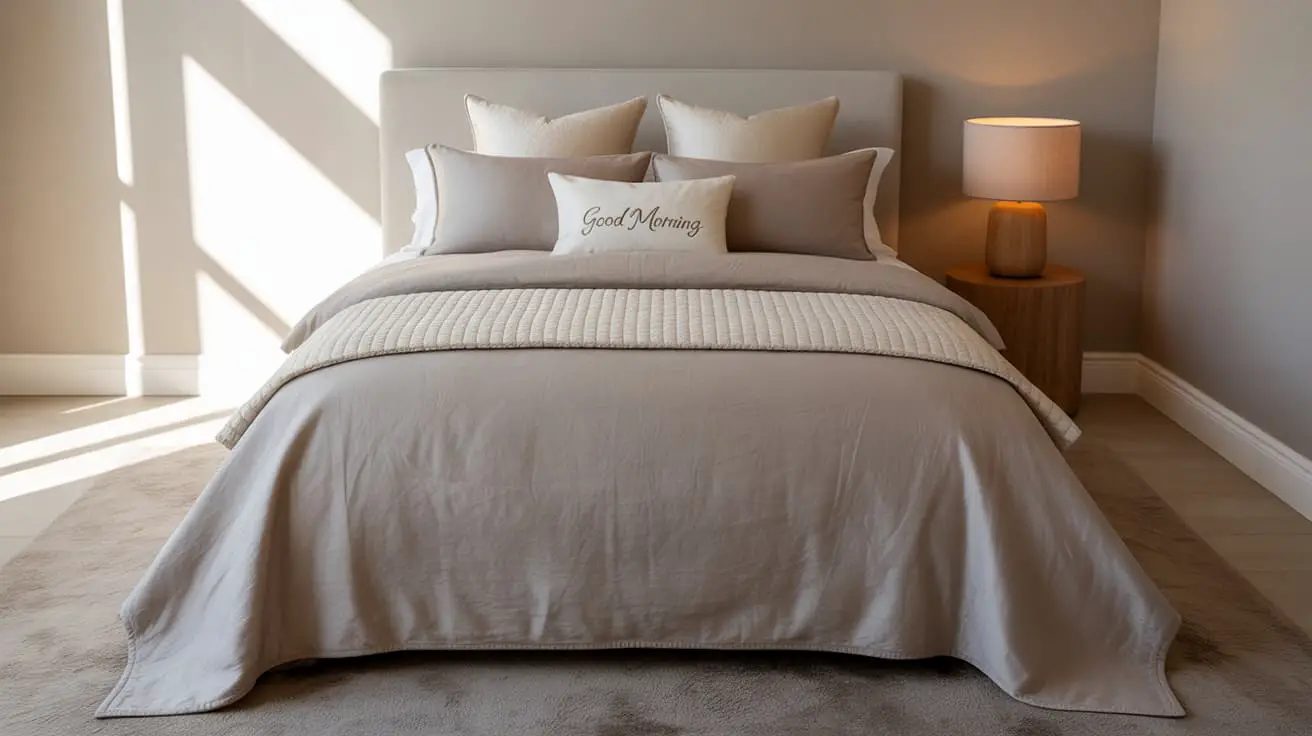
Gray has gotten a bad rap for being cold, but the right gray can create a
modern small bedroom that feels both spacious and sophisticated.
Warm grays work best in small bedrooms:
- Light taupe-gray for a cozy, hotel-like feel
- Dove gray for a timeless, elegant atmosphere
- Greige (gray-beige hybrid) for the perfect balance of warmth and modernity
Pro tip: Test your gray paint in different lighting conditions. What looks perfect at noon might appear purple or blue at night.
Beiges and Earth Tones
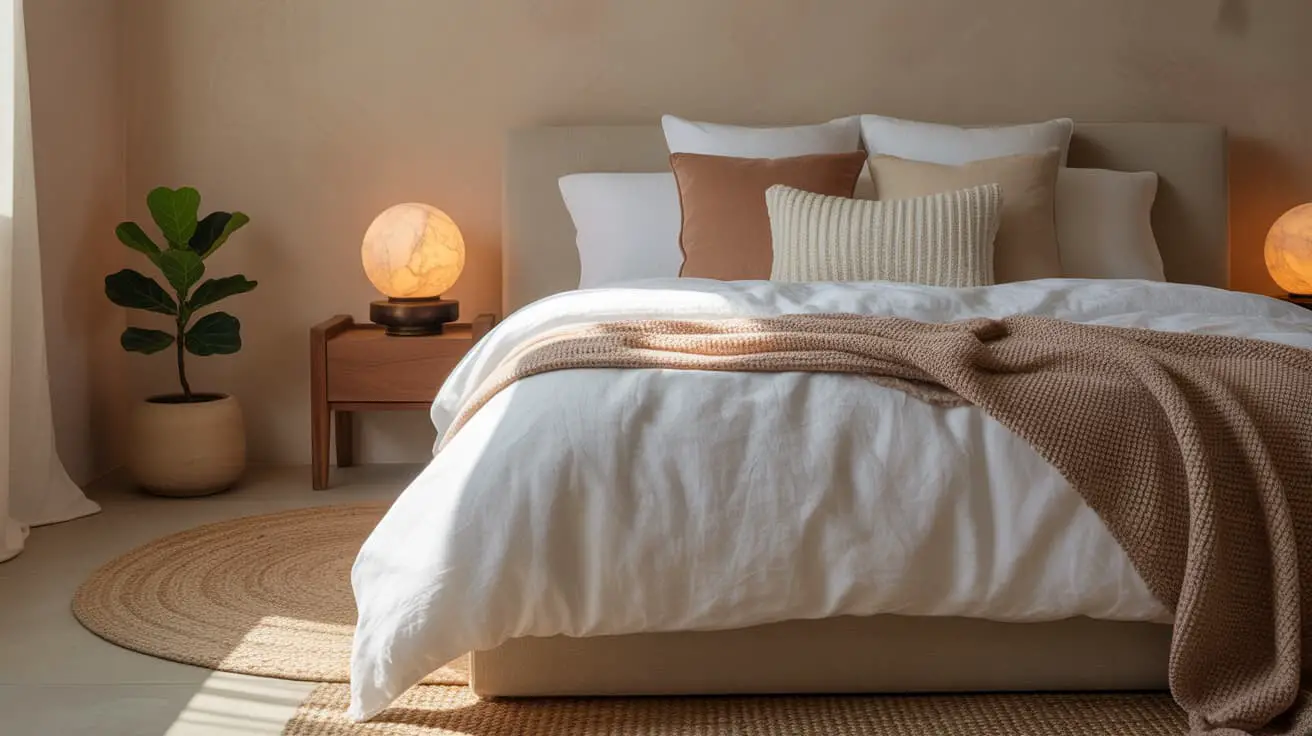
Beige isn’t boring—it’s brilliant.
Cozy small bedroom designs often rely on these warm neutrals to create a sense of comfort without closing in the space.
Consider these sophisticated beige variations:
- Mushroom beige for depth without darkness
- Linen beige for a casual, relaxed vibe
- Sandy beige for warmth and light reflection
Bold Moves: Using Color to Create Visual Interest
The Accent Wall Strategy
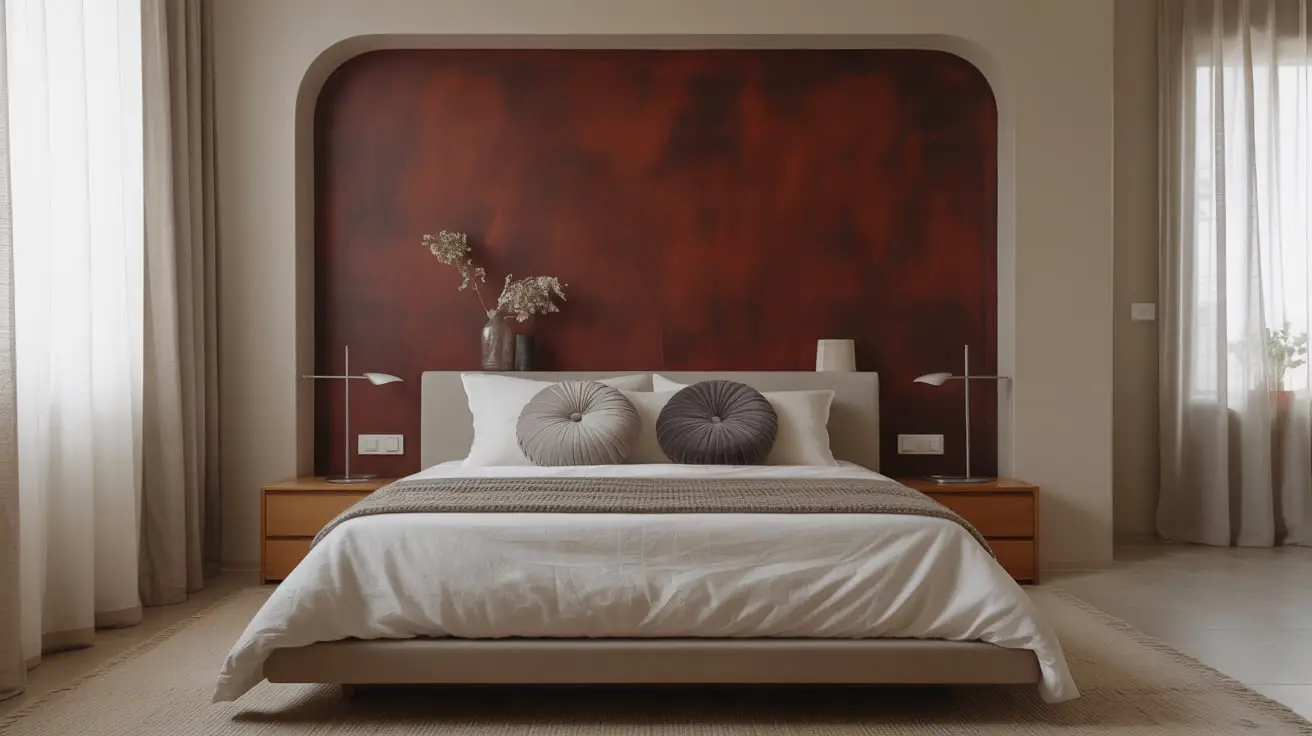
Here’s where we get rebellious. Who says
small bedroom decor has to play it safe? A strategic accent wall can actually make your room feel larger by creating depth and focal points.
Best accent wall colors for small bedrooms:
- Deep navy blue: Creates a cozy, intimate feel while making other walls appear to recede
- Forest green: Brings in nature’s calming influence
- Rich burgundy: Adds sophistication without overwhelming
The key is choosing the right wall—typically the one behind your headboard—and keeping the other three walls light.
Explore our guide to 12 essential furniture pieces for a luxury master bedroom ➝
Monochromatic Magic
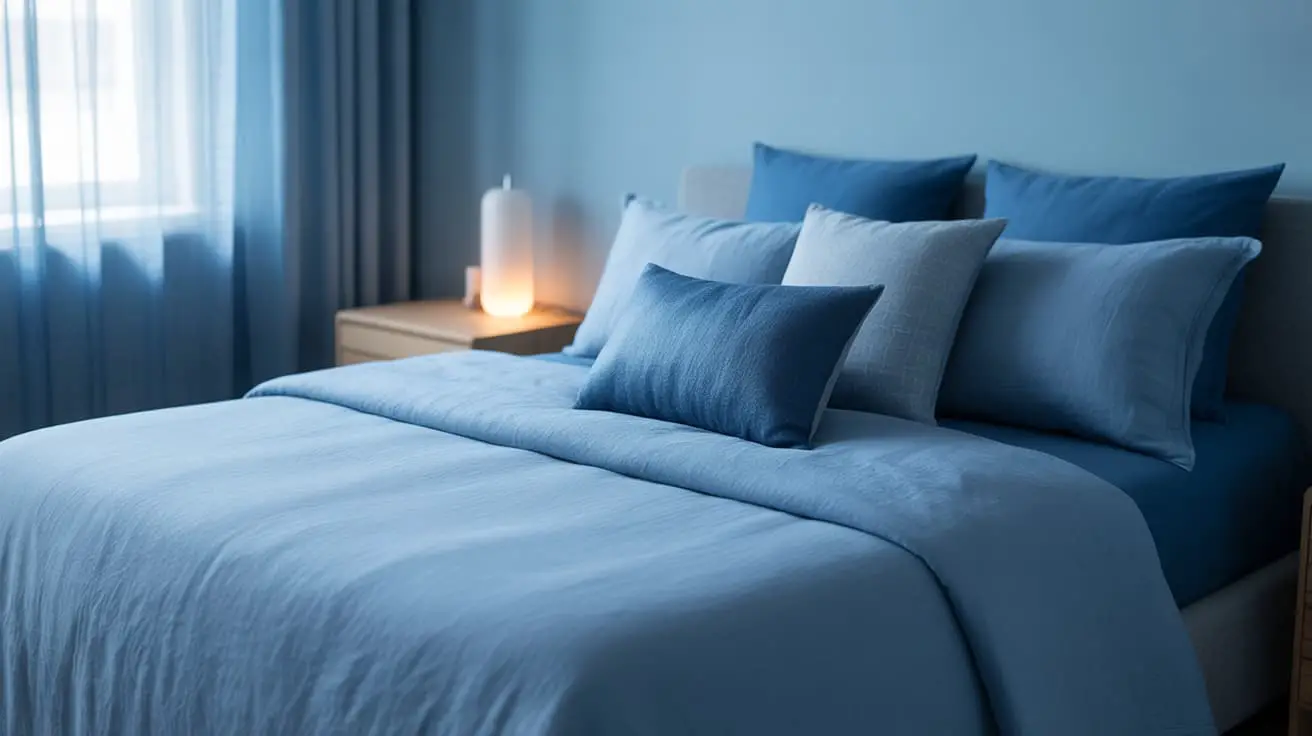
Monochromatic doesn’t mean monotonous. Using various shades of the same color creates visual flow that makes spaces feel cohesive and, surprisingly, larger.
Popular monochromatic schemes:
- Blues: From powder blue walls to navy accents
- Greens: Sage walls with deeper green textiles
- Pinks: Blush walls with rose gold accessories
The Power Players: Colors That Transform Small Spaces
Soft Blues: Your Sleep Sanctuary
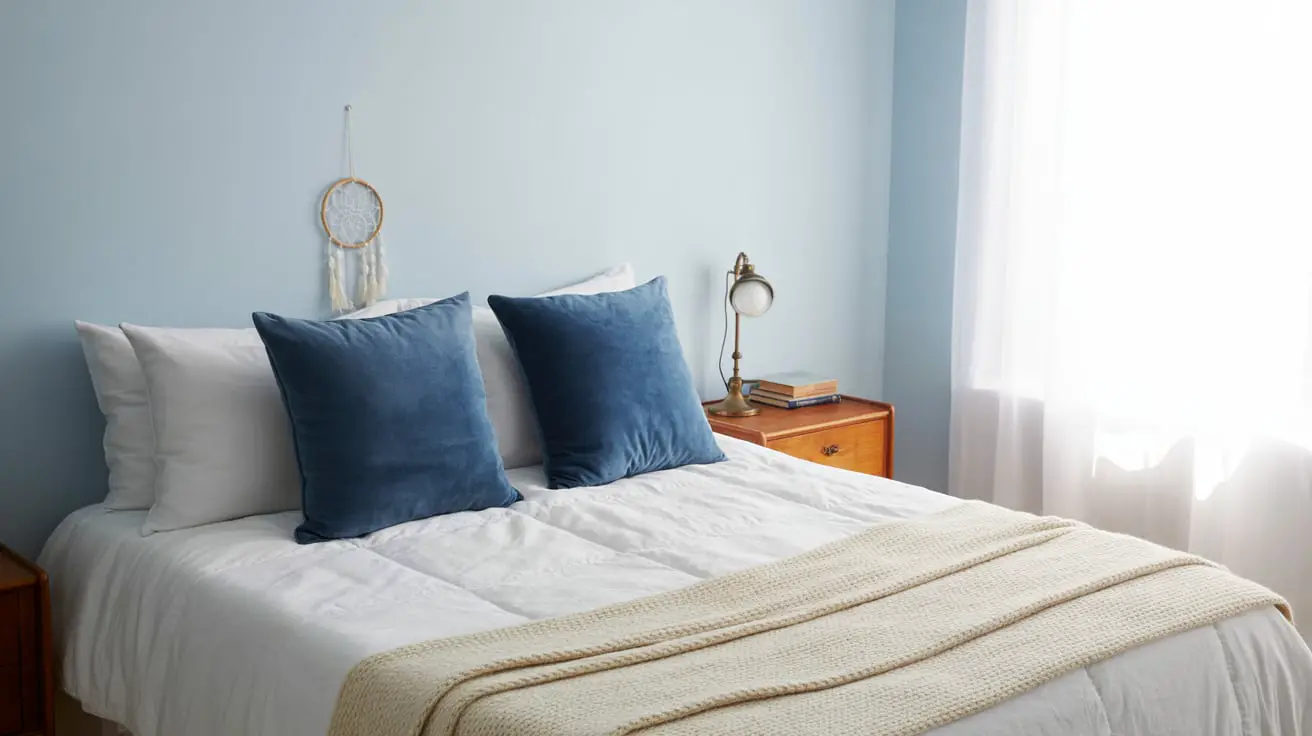
Blue isn’t just calming—it’s scientifically proven to lower blood pressure and heart rate. In
small bedroom design tips, blue consistently ranks as a top choice for creating restful environments.
Winning blue combinations:
- Powder blue walls with white trim and navy accents
- Sky blue with cream and gold touches
- Steel blue with warm wood tones
Gentle Greens: Nature’s Space Enhancer
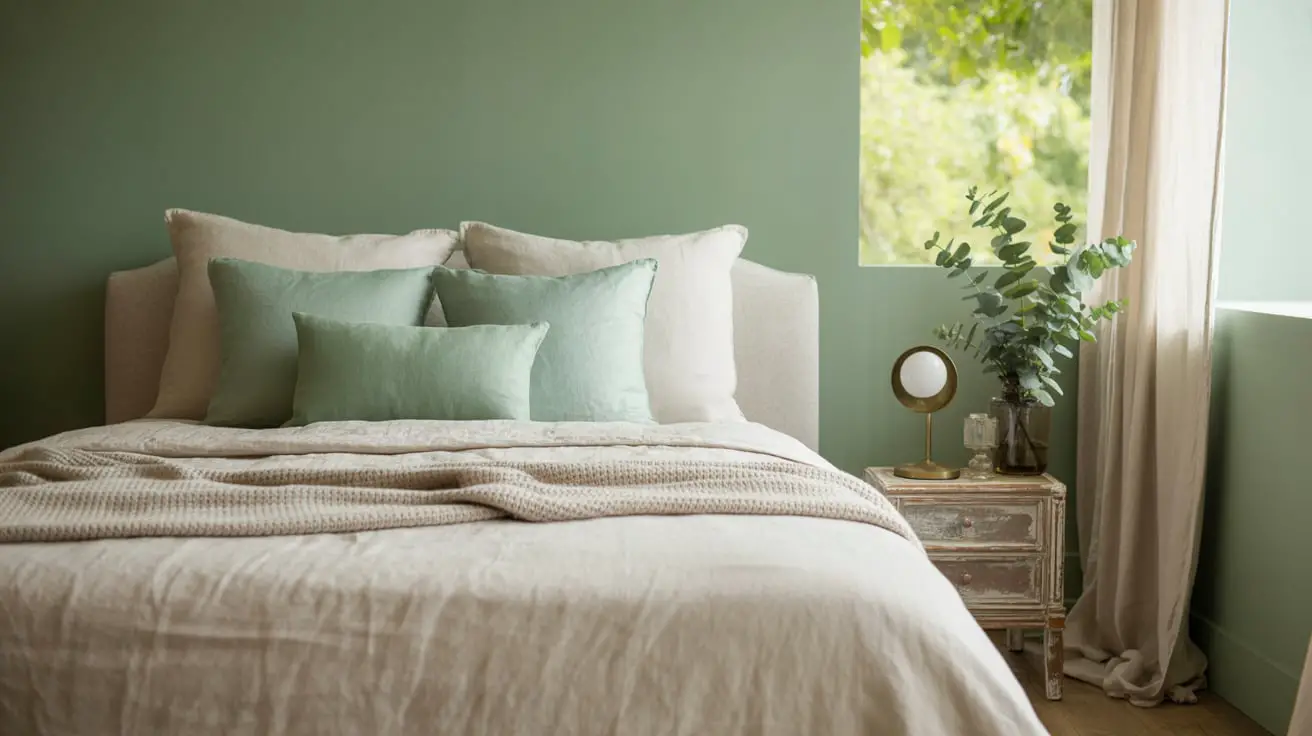
Green connects us to nature, and in small spaces, this connection becomes even more important.
Scandinavian small bedroom ideas often incorporate sage greens and eucalyptus tones for their calming, space-enhancing properties.
Green schemes that work:
- Sage green with white and natural wood
- Mint green with gold accents
- Olive green with cream and brass details
Warm Pinks: The Unexpected Champion
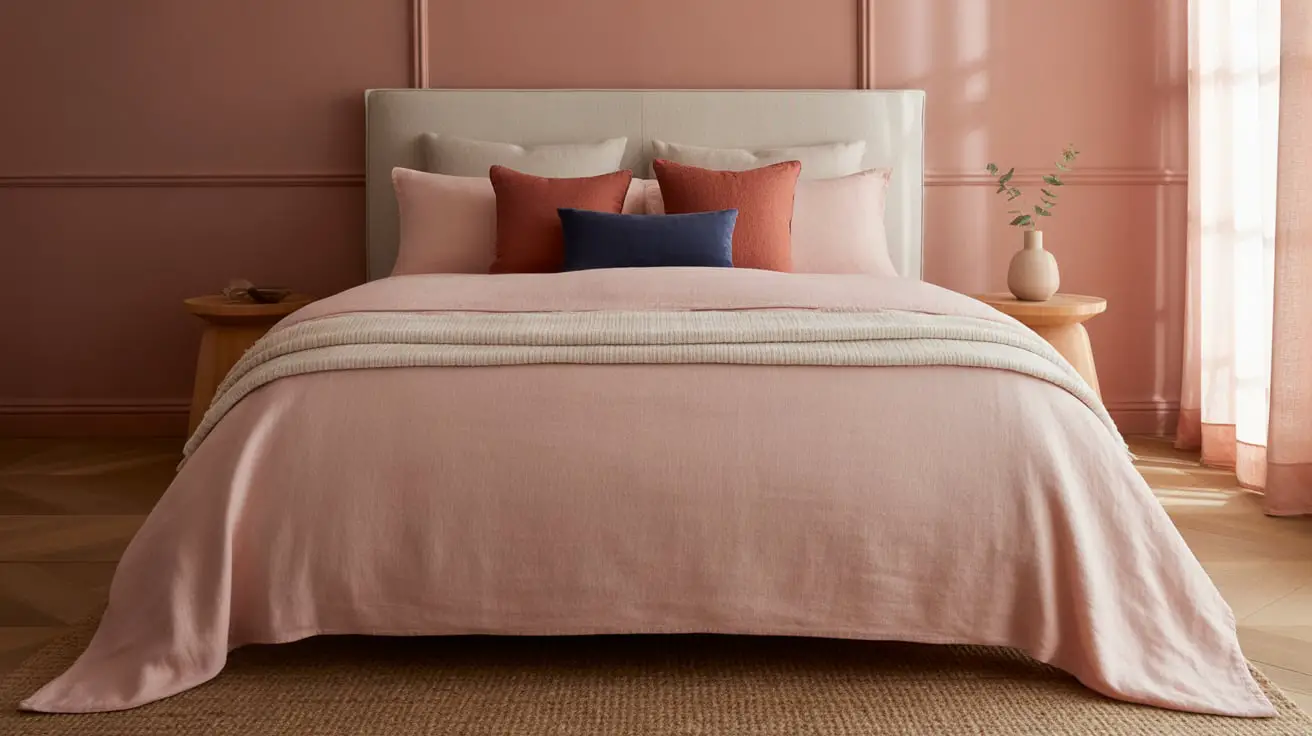
Pink isn’t just for kids’ rooms. Sophisticated pink tones can create incredibly inviting
minimalist small bedroom spaces that feel both grown-up and welcoming.
Mature pink palettes:
- Dusty rose with gray and white
- Blush pink with navy and gold
- Terracotta pink with cream and brown
Color Combinations That Actually Work in Small Bedrooms
| Color Scheme |
Primary Color |
Secondary Colors |
Best For |
Mood Created |
| Coastal Calm |
Soft blue |
White, cream, light gray |
Beach lovers, stress relief |
Peaceful, airy |
| Warm Minimalism |
Cream |
White, light brown, gold |
Modern aesthetics |
Clean, cozy |
| Forest Retreat |
Sage green |
White, natural wood |
Nature enthusiasts |
Grounding, fresh |
| Sophisticated Neutrals |
Greige |
White, black accents |
Contemporary style |
Balanced, timeless |
| Sunset Glow |
Warm peach |
Cream, gold, soft pink |
Romantic vibes |
Energizing, warm |
Common Color Mistakes That Shrink Your Space
Let me save you from the pitfalls I’ve seen countless times in
small apartment bedroom inspiration gone wrong:
Mistake #1: Going too dark too quickly Just because you saw a gorgeous black bedroom in a magazine doesn’t mean it’ll work in your 8×10 space. Dark colors absorb light, making small rooms feel cramped.
Mistake #2: Choosing colors based on trends alone That avocado green might be Instagram-famous, but if it doesn’t complement your natural light, you’ll regret it every morning.
Mistake #3: Ignoring undertones That “neutral” beige might have pink undertones that clash with your cool-toned furniture. Always test colors in your actual space.
Mistake #4: Painting everything the same shade Monochrome doesn’t mean mono-shade. Use varying tones of your chosen color to create depth.
Lighting: Your Color Scheme’s Best Supporting Actor
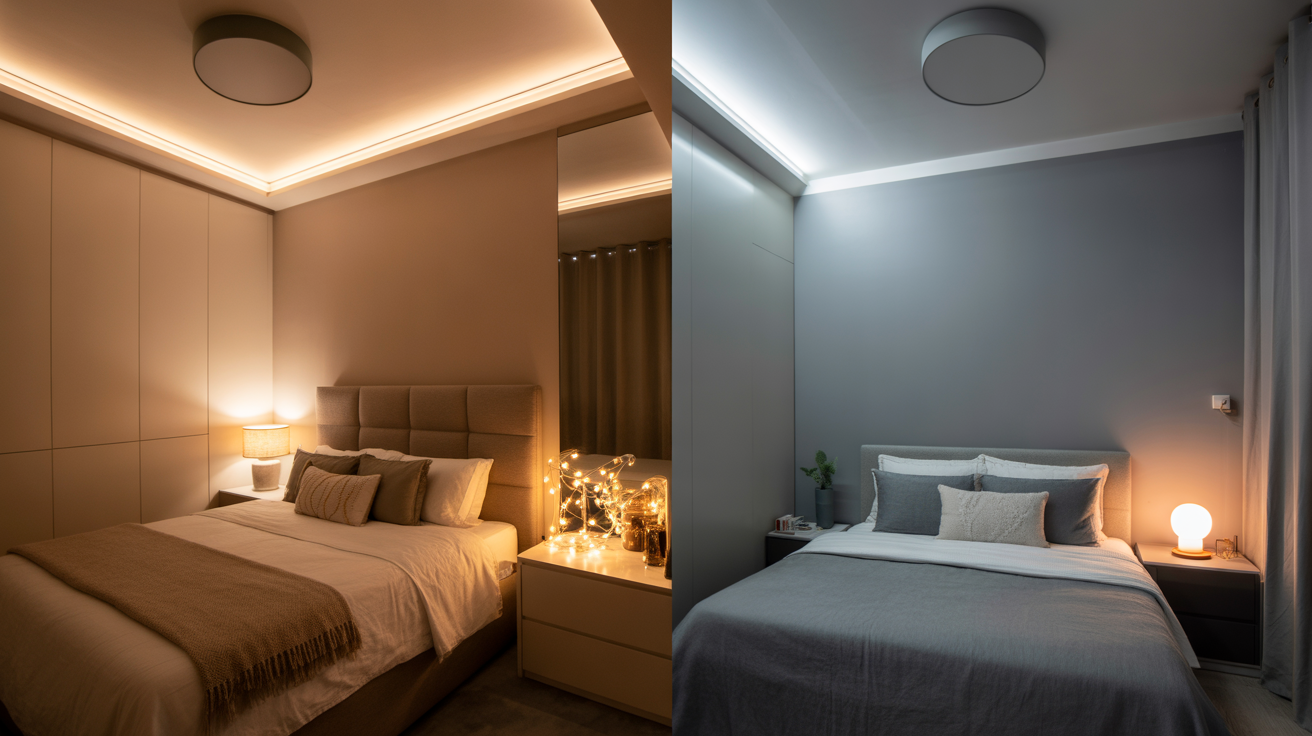
The best
small bedroom lighting ideas work hand-in-hand with your color choices. Warm LED bulbs enhance warm color schemes, while cool daylight bulbs complement cooler tones.
Lighting tips for small bedrooms:
- Layer your lighting: overhead, task, and ambient
- Use mirrors to multiply light sources
- Consider wall sconces to save nightstand space
- Add fairy lights for cozy ambiance
Budget-Friendly Color Transformations
Budget small bedroom decor doesn’t mean sacrificing style. Here are wallet-friendly ways to implement these color schemes:
Paint: Obviously the biggest impact for the least cost. Choose one accent wall if full-room painting isn’t in the budget.
Textiles: Swap out bedding, curtains, and throw pillows to introduce new colors without permanent commitment.
Accessories: Add color through artwork, plants, and small decorative objects.
DIY projects: Create your own artwork or recover furniture in your chosen color scheme.
Making Dark Colors Work (Yes, It’s Possible!)
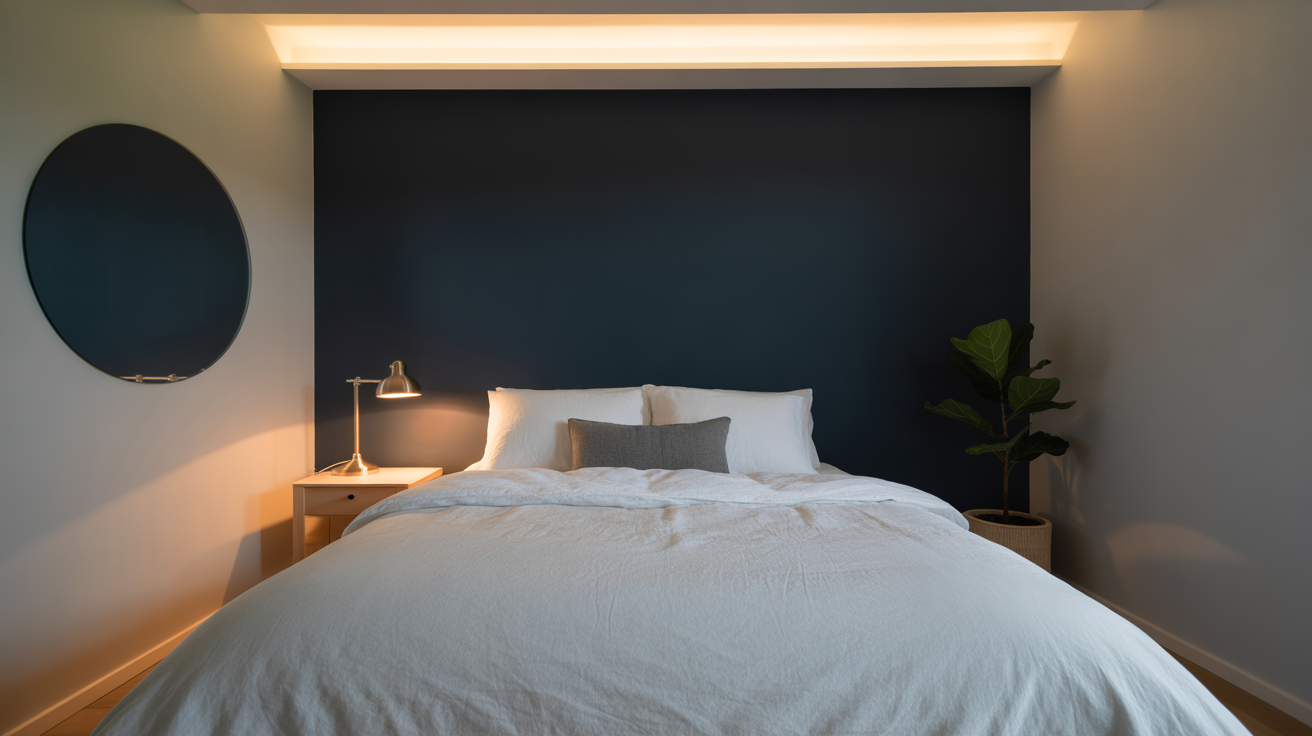
Sometimes you fall in love with a dramatic color, and I’m not here to crush dreams. Here’s how to use darker colors without sacrificing space:
The 60-30-10 rule: 60% light colors, 30% medium tones, 10% dark accents
Strategic placement: Use dark colors on accent walls or below the chair rail
Balance with light: Pair dark colors with plenty of white and light neutrals
Add reflective surfaces: Mirrors, metallic accents, and glossy finishes bounce light around
Seasonal Color Adjustments for Small Bedrooms
Your
cozy small bedroom can evolve with the seasons without major overhauls:
Spring/Summer: Lighter, cooler tones—whites, soft blues, pale greens
Fall/Winter: Warmer, richer tones—creams, warm grays, soft earth tones
Switch out textiles, artwork, and accessories to refresh your space seasonally.
The Psychology Behind Color Choices
Understanding how colors affect your mood is crucial for
small bedroom organization solutions that actually work long-term:
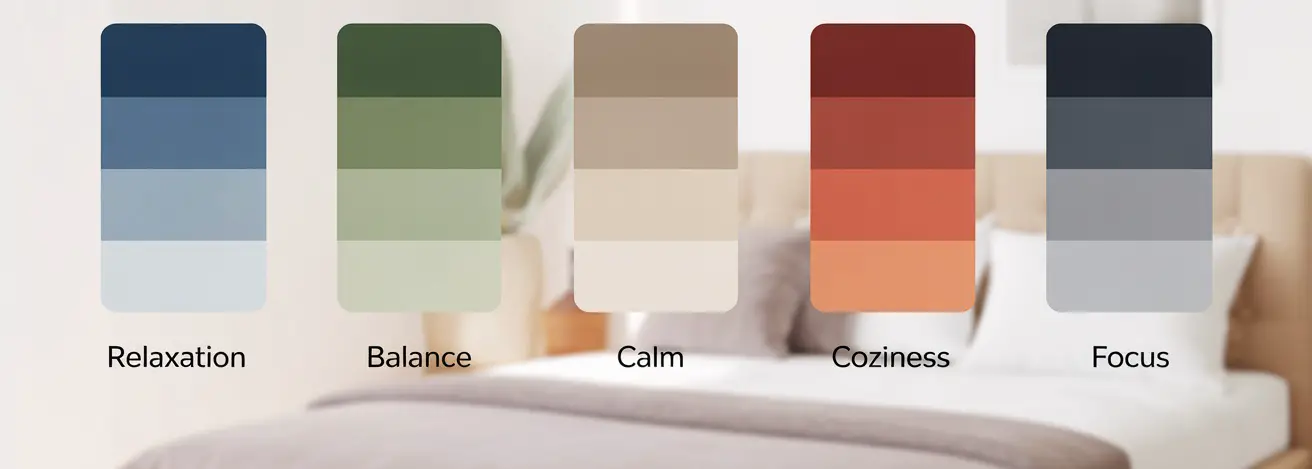
Your Action Plan: Implementing Your Perfect Color Scheme
Ready to transform your space? Here’s your step-by-step approach:
- Assess your natural light: North-facing rooms need warmer colors; south-facing can handle cooler tones
- Consider your lifestyle: Do you need energizing morning colors or calming evening tones?
- Start small: Test colors with removable wallpaper or large fabric swatches
- Think long-term: Choose a base that you won’t tire of quickly
- Plan for flexibility: Select a foundation that allows for seasonal updates
Final Thoughts: Your Small Bedroom, Your Rules
The
best colors for small bedroom design aren’t just about following rules—they’re about creating a space that makes you feel amazing every single day. Whether you go bold with a dramatic accent wall or keep it serene with soft neutrals, the key is choosing colors that reflect your personality while working with your space’s natural characteristics.
Remember, your bedroom is where you start and end each day. It should energize you in the morning and calm you at night. The right color scheme doesn’t just make your room look bigger—it makes your entire life feel more organized, peaceful, and intentional.
Ready to transform your small bedroom into a color-coordinated sanctuary? Start with one element—maybe new bedding in your chosen color palette—and build from there. Your future self will thank you for creating a space that’s both beautiful and functional.
Meta Description: Discover the best color schemes for small bedroom interior design. Expert tips on paint colors, combinations, and design strategies that make tiny bedrooms feel spacious and stylish.
 You know that feeling when you walk into a tiny hotel room in Manhattan, and somehow it feels more spacious than your actual bedroom back home? The secret isn’t magic—it’s masterful color selection. I’ve spent years studying how color transforms small spaces, and I’m here to share the game-changing schemes that’ll make your compact bedroom feel like a breath of fresh air.
Your bedroom should be your sanctuary, not a cramped afterthought. Whether you’re dealing with a studio apartment or just got stuck with the smallest room in the house, the right colors can completely transform how your space feels and functions.
You know that feeling when you walk into a tiny hotel room in Manhattan, and somehow it feels more spacious than your actual bedroom back home? The secret isn’t magic—it’s masterful color selection. I’ve spent years studying how color transforms small spaces, and I’m here to share the game-changing schemes that’ll make your compact bedroom feel like a breath of fresh air.
Your bedroom should be your sanctuary, not a cramped afterthought. Whether you’re dealing with a studio apartment or just got stuck with the smallest room in the house, the right colors can completely transform how your space feels and functions.
 White remains the undisputed champion of small space bedroom solutions. But here’s where most people go wrong—they think all whites are created equal. They’re not.
Pure white can feel clinical and cold, especially in bedrooms without abundant natural light. Instead, consider these sophisticated alternatives:
White remains the undisputed champion of small space bedroom solutions. But here’s where most people go wrong—they think all whites are created equal. They’re not.
Pure white can feel clinical and cold, especially in bedrooms without abundant natural light. Instead, consider these sophisticated alternatives:
 Gray has gotten a bad rap for being cold, but the right gray can create a modern small bedroom that feels both spacious and sophisticated.
Warm grays work best in small bedrooms:
Gray has gotten a bad rap for being cold, but the right gray can create a modern small bedroom that feels both spacious and sophisticated.
Warm grays work best in small bedrooms:
 Beige isn’t boring—it’s brilliant. Cozy small bedroom designs often rely on these warm neutrals to create a sense of comfort without closing in the space.
Consider these sophisticated beige variations:
Beige isn’t boring—it’s brilliant. Cozy small bedroom designs often rely on these warm neutrals to create a sense of comfort without closing in the space.
Consider these sophisticated beige variations:
 Here’s where we get rebellious. Who says small bedroom decor has to play it safe? A strategic accent wall can actually make your room feel larger by creating depth and focal points.
Best accent wall colors for small bedrooms:
Here’s where we get rebellious. Who says small bedroom decor has to play it safe? A strategic accent wall can actually make your room feel larger by creating depth and focal points.
Best accent wall colors for small bedrooms:
 Monochromatic doesn’t mean monotonous. Using various shades of the same color creates visual flow that makes spaces feel cohesive and, surprisingly, larger.
Popular monochromatic schemes:
Monochromatic doesn’t mean monotonous. Using various shades of the same color creates visual flow that makes spaces feel cohesive and, surprisingly, larger.
Popular monochromatic schemes:
 Blue isn’t just calming—it’s scientifically proven to lower blood pressure and heart rate. In small bedroom design tips, blue consistently ranks as a top choice for creating restful environments.
Winning blue combinations:
Blue isn’t just calming—it’s scientifically proven to lower blood pressure and heart rate. In small bedroom design tips, blue consistently ranks as a top choice for creating restful environments.
Winning blue combinations:
 Green connects us to nature, and in small spaces, this connection becomes even more important. Scandinavian small bedroom ideas often incorporate sage greens and eucalyptus tones for their calming, space-enhancing properties.
Green schemes that work:
Green connects us to nature, and in small spaces, this connection becomes even more important. Scandinavian small bedroom ideas often incorporate sage greens and eucalyptus tones for their calming, space-enhancing properties.
Green schemes that work:
 Pink isn’t just for kids’ rooms. Sophisticated pink tones can create incredibly inviting minimalist small bedroom spaces that feel both grown-up and welcoming.
Mature pink palettes:
Pink isn’t just for kids’ rooms. Sophisticated pink tones can create incredibly inviting minimalist small bedroom spaces that feel both grown-up and welcoming.
Mature pink palettes:
 The best small bedroom lighting ideas work hand-in-hand with your color choices. Warm LED bulbs enhance warm color schemes, while cool daylight bulbs complement cooler tones.
Lighting tips for small bedrooms:
The best small bedroom lighting ideas work hand-in-hand with your color choices. Warm LED bulbs enhance warm color schemes, while cool daylight bulbs complement cooler tones.
Lighting tips for small bedrooms:
 Sometimes you fall in love with a dramatic color, and I’m not here to crush dreams. Here’s how to use darker colors without sacrificing space:
The 60-30-10 rule: 60% light colors, 30% medium tones, 10% dark accents
Strategic placement: Use dark colors on accent walls or below the chair rail
Balance with light: Pair dark colors with plenty of white and light neutrals
Add reflective surfaces: Mirrors, metallic accents, and glossy finishes bounce light around
Sometimes you fall in love with a dramatic color, and I’m not here to crush dreams. Here’s how to use darker colors without sacrificing space:
The 60-30-10 rule: 60% light colors, 30% medium tones, 10% dark accents
Strategic placement: Use dark colors on accent walls or below the chair rail
Balance with light: Pair dark colors with plenty of white and light neutrals
Add reflective surfaces: Mirrors, metallic accents, and glossy finishes bounce light around


Hi that was a great article
Thank you so much! appreciate it!
Pingback: Common Mistakes to Avoid in Bedroom Decoration: Your Guide to Creating the Perfect Sleep Sanctuary – honeydwelling.com
Pingback: 10 Must-Have Pieces for a Luxury Bedroom - honeydwelling.com